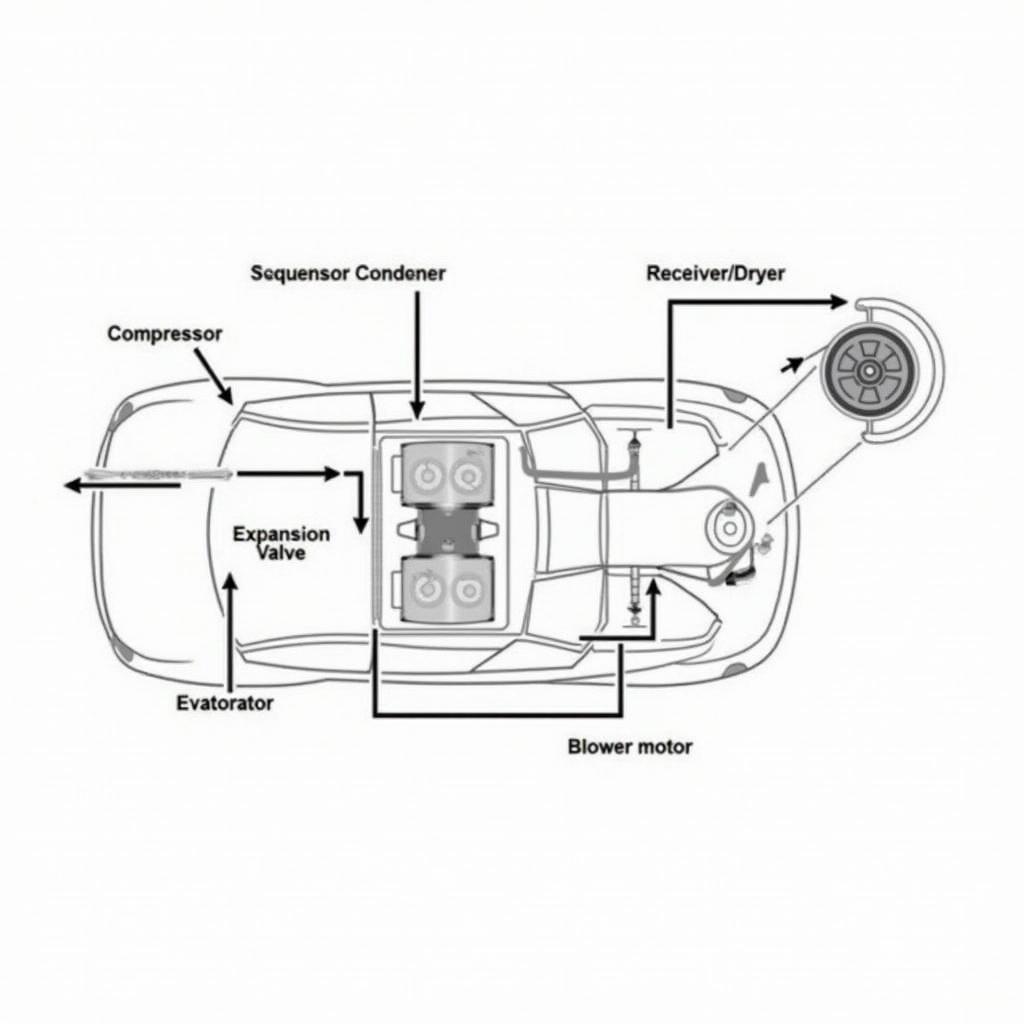Keeping your car’s air conditioning system in top shape is crucial, especially during the scorching summer months. A malfunctioning AC can turn your daily commute or road trip into an uncomfortable experience. This comprehensive guide provides valuable insights into “air conditioning repair car” and equips you with the knowledge to ensure a comfortable ride no matter the weather.
Understanding Your Car’s AC System
Before diving into common AC issues and repairs, it’s essential to grasp the basics of how your car’s air conditioning system works. At its core, the AC system operates on the principle of heat transfer, using refrigerant to cool the air inside your car.
The system consists of several key components:
- Compressor: This component compresses the refrigerant gas, raising its temperature.
- Condenser: Similar to a radiator, the condenser cools down the high-pressure, hot refrigerant gas, converting it into a liquid form.
- Receiver/Dryer: This component stores the liquid refrigerant and removes any moisture from it.
- Expansion Valve: This valve regulates the flow of refrigerant into the evaporator.
- Evaporator: As the refrigerant evaporates in this component, it absorbs heat from the surrounding air, effectively cooling it down.
- Blower Motor: This motor forces the cooled air through your car’s vents and into the cabin.
Common Car Air Conditioning Problems
Several issues can plague your car’s AC system, leading to reduced cooling efficiency or complete system failure. Recognizing these problems early on can save you from costly repairs and uncomfortable drives.
1. Refrigerant Leak
One of the most prevalent reasons for poor AC performance is a refrigerant leak. Over time, the refrigerant lines can develop cracks or leaks at connection points, resulting in reduced cooling capacity.
2. Compressor Failure
The compressor is the heart of your AC system. If the compressor fails, the system cannot compress the refrigerant, effectively halting the cooling process.
3. Electrical Issues
The AC system relies on various electrical components, such as fuses, relays, and wiring harnesses. A malfunction in any of these components can disrupt the system’s operation.
4. Blower Motor Problems
A faulty blower motor can hinder the flow of cool air into the cabin, even if the rest of the AC system is functioning correctly.
5. Clogged Condenser
Debris, dirt, and insects can accumulate on the condenser over time, restricting airflow and reducing cooling efficiency.
Signs Your Car AC Needs Repair
Identifying early warning signs of a failing AC system can help prevent further damage and costly repairs down the line.
- Weak Airflow: If the air coming from your vents is noticeably weaker than usual, it could indicate a problem with the blower motor or a blockage in the system.
- Warm Air Instead of Cold: This is a clear sign that your AC system is not functioning correctly. It could be due to a refrigerant leak, compressor failure, or other issues.
- Strange Noises: Unusual noises, such as hissing, grinding, or clicking, coming from the AC system, often indicate a problem that requires attention.
- Unpleasant Odors: Foul or musty smells emanating from the vents suggest mold or bacteria growth within the system, usually in the evaporator.
DIY vs. Professional Air Conditioning Repair Car
While some minor AC maintenance tasks, like recharging the refrigerant, can be performed by experienced DIYers, it’s generally recommended to seek professional help for any significant repairs.
AC systems are complex, and improper handling can lead to further damage or even pose safety risks. A qualified mechanic possesses the expertise, tools, and knowledge to diagnose and repair your car’s AC system effectively.
“Attempting to fix a complex issue like a compressor failure without proper training and equipment can lead to more harm than good,” advises John Smith, a seasoned automotive technician with over 20 years of experience. “It’s always best to err on the side of caution and leave it to the professionals.”
Finding a Reliable Air Conditioning Repair Car Service
When searching for a trustworthy mechanic to service your car’s AC system, consider the following factors:
- Experience and Expertise: Look for a mechanic or repair shop specializing in air conditioning repair car services.
- Certifications and Licenses: ASE-certified technicians have demonstrated knowledge and skills in automotive repair.
- Customer Reviews and Ratings: Online reviews and testimonials from previous customers can provide insights into the quality of service.
- Warranty and Guarantees: Reputable repair shops stand behind their work and offer warranties on parts and labor.
Tips for Maintaining Your Car’s AC System
Regular maintenance can extend the lifespan of your car’s AC system and prevent costly repairs in the long run. Here are a few helpful tips:
- Schedule Annual AC Inspections: Have your car’s AC system inspected by a qualified mechanic at least once a year, preferably before the start of the summer season.
- Run Your AC Regularly: Even during cooler months, running your AC system for a few minutes every couple of weeks can help keep the components lubricated and prevent refrigerant leaks.
- Keep the Condenser Clean: Periodically clean the condenser of debris, dirt, and leaves to ensure optimal airflow.
- Check for Leaks: Regularly inspect the refrigerant lines and connections for any signs of leaks.
By following these maintenance tips and addressing any issues promptly, you can ensure that your car’s AC system keeps you cool and comfortable for years to come.
Conclusion
A properly functioning air conditioning system is essential for a comfortable driving experience, especially during hot weather. Understanding the basics of your car’s AC system, recognizing common problems, and seeking professional help when needed can save you from discomfort and costly repairs. Remember, regular maintenance and early detection of issues are key to keeping your car cool and your journeys enjoyable.
FAQs
Q: How often should I recharge my car’s AC system?
A: If your AC system is functioning correctly, you should not need to recharge it frequently. A refrigerant leak is usually the culprit if you require frequent recharges.
Q: Can I use any refrigerant to recharge my car’s AC?
A: No, using the incorrect type of refrigerant can damage your AC system. Refer to your owner’s manual or consult a professional to determine the suitable refrigerant for your car.
Q: How much does it cost to repair a car AC system?
A: The cost of air conditioning repair car services can vary widely depending on the problem’s severity, the car’s make and model, and the labor rates in your area.
If you’re experiencing car air conditioning issues and need reliable repairs, don’t hesitate to reach out for assistance. Contact our expert team via WhatsApp at +1(641)206-8880 or email us at [email protected]. We’re available 24/7 to provide top-notch support for all your car repair needs. Explore our website for more helpful articles on air conditioning repair car suffolk, air conditioning repair cars, and specific locations such as car air conditioning repairs townsville, car air conditioning repair stranraer, and car air conditioning repair tampa.



